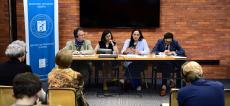
Freedom of religion or belief and security: event overview
On 24 January, the Tolerance and Diversity Institute (TDI) and the Eurasia Partnership Foundation Armenia (EPF) organized an online discussion on freedom of religion or belief and security. National and international experts, representatives of religious associations and media participating in the event discussed pressing issues and problems related to freedom of religion or belief and security in Georgia and Armenia as well as in the region. The aim of the event was to analyze threats to fundamental right of freedom of religion or belief, discuss relevant challenges existing in Georgia and in the region, in general, and to talk about future prospects.
The speakers at the event were: Isabella Sargsyan, Program Director of Eurasia Partnership Foundation Armenia; Arijana Aganovic, Associate Officer on Freedom of Religion or Belief at the OSCE/ODIHR; Beka Mindiashvili, Head of the Tolerance Centre under the Auspices of the Office of Public Defender; John Kinahan, Editor of Forum 18; Mariam Gavtadze, lawyer, TDI Board member; Malkhaz Songhulashvili the Metropolitan Bishop of Tbilisi of Evangelical-Baptist Church of Georgia; Tariel Nakaidze, representative of Muslim community and Member of Parliament of Georgia; Levan Sutidze, Editor-in-Chief of online news media Tabula and religious commentator. The discussion was moderated by Eka Chitanava, Director of TDI.
The event was attended by religious organizations from Georgia and Armenia, representatives of national and international organizations as well as diplomatic corps.
Participants discussed a range of relevant topics including the risks of interpreting freedom of religion or belief as conflicting with the state security, international standards applied in this regard, the policy on religious organizations pursued in Georgia and in the region, and approaches of various regimes to the issue of intersection of security and human rights.
In her welcome speech, the Program Director of Eurasia Partnership Foundation Armenia, Ms. Isabella Sargsyan, underlined the support provided by the Embassy of the Kingdom of the Netherlands to long-standing cooperation between Armenia and Georgia, including in the area of freedom of religion or belief. According to Isabella Sargsyan, exchange of experience between Armenia and Georgia is important as similar trends can often be observed in these two countries. For example, Armenia has planned to introduce amendments to the Constitution. In this regard it would be interesting for Armenian civil society and religious groups to learn about ways of advocating the replacement of “state security” with “public order” as a permissibleground of limiting the manifestation of freedom of religion or belief in the Constitution.
Associate Officer for the OSCE Office for Democratic Institutions and Human Rights (OSCE/ ODIHR), Ms. Ariana Aganovich, spoke on OSCE standards and approaches to security and freedom of religion. She noted that with regards to the relationship between FoRB and Security, it is important to emphasize that OSCE has a holistic approach to security, which is to be understood as comprehensive, co-operative, equal, indivisible and grounded in human rights. This means that countries need to respect human rights not just, because it is an obligation, but also to achieve greater levels of national security. The state has an obligation to protect all communities, regardless of their legal status (registered or non-registered, majority or minority, traditional or non-traditional). According to Aganovich sometimes, measures by States are enacted in the name of “national” or “state” security, or in the interests of preserving or maintaining “peaceful coexistence”, “social stability” or “social harmony”. As the OSCE approach shows us, measures that breach human rights in the name of security may only undermine it.
The potential challenges related to the accommodation of a diversity of religions and beliefs throughout the OSCE region, as well as the threat posed by violent extremism and radicalization that lead to terrorism, of which religion has often been mistakenly viewed as the main driver, have brought the relationship between freedom of thought, conscience, religion or belief and the need to provide security into focus across the OSCE.
Some areas of concern are related to situations when the intersection of security and FoRB may cause serious challenges for the legislature, the judiciary, law enforcement, and/or security officers. Such issues could be, for example, whether to (de)register religious or belief organizations, what is “extremist” speech, how to conduct searches of houses of worship, whether it makes sense or not to prohibit conversion activities, and whether foreign involvement with religious communities is somehow dangerous or not.
Ms. Aganovich noted that OSCE’s comprehensive approach to security does not frame freedom of religion or belief and security as competing rights, but recognizes them as complementary and interdependent. They can and must be advanced together.
Forum 18 Editor John Kinahan noted that the topics of FoRB and security have long been linked in Georgia in a way that undermines both. Mr. Kinahan, noted that the first question we might ask about FoRB and security is this: whose security are we talking about? Are we talking about the security of people who exercise their human rights? Or are we talking about the security of a government wanting to control society?
Like Aganovich, Mr. Kinahan clarified that FoRB and security are not “competing rights, but complementary, interdependent and mutually reinforcing objectives that can and must be advanced together”.
He also reviewed the cases of persecution in the region in the name of restricting religious freedom and "security." This was tragically underlined by events in Kazakhstan, including the murder and detention by “security” forces of unknown numbers of peaceful protestors and the evidence-free labelling of them as “terrorists”. Among the many regime targets, Muslims are also persecuted for following Islam outside state-controlled structures. The authorities are using either Article 174 of the Criminal Code (“Incitement of religious discord”) or Article 256 (“Propaganda of terrorism”) to prosecute so-called Islamists who in practice have not committed any acts of terrorism or extremism. According to Mr. Kinahan, all exercise of FoRB without state permission is illegal, and even communities that have state permission to exist also need permission for where they hold meetings for worship. Those who violate these provisions, and those who choose to meet for worship without seeking state permission, face punishment.
Mr. Kinahan concluded that if we want to play our part in advancing every country’s – including Georgia’s - security and stability, the question before us today is this: how can we protect and advance everyone’s “robust exercise of human rights” ?
The Head of the Tolerance Center under the Auspices of the Public Defender, Mr. Beka Mindiashvili, and the Strategic Litigation Program Director of TDI, Ms. Mariam Gavtadze, overviewed the situation in Georgia with regard to the exercise of freedom of religion, problems of state policy on religion, issues of security and religious freedom, and the impact of State policy on human rights, religious and civil society organizations specializing in freedom of religion.
Beka Mindiashvili spoke about attempts undertaken by the government in the past few years to restrict freedom of religion on the ground of state security by means of constitutional amendments, although the international standards of human rights rule out the restriction of freedom of religion on that ground. He also spoke about the recent release of state security materials that came as a shock as the alleged State Security Service (SSS) materials revealed that religious organizations, nongovernmental organizations, media and people defending freedom of religion and human rights had been subjected to illegal surveillance and eavesdropping.
Beka Mindiashvili went on to say that the nondiscrimination policy declared by the state was problematic as evidenced by the events of 5 July 2021 when the state failed to defend the freedom of assembly and the health of Tbilisi Pride participants and journalists. According to him, the statement of the Prime Minister of Georgia was especially alarming as he openly declared that he did not intend to defend the rights of minorities and that minorities could not set the agenda for the majority in Georgia. That statement concerned all minorities, not only sexual minorities. According to Mindiashvili, the discriminatory policy pursued by the state against minorities also sets the tone for the policy and rhetoric of the State Agency for Religious Issues (SARI) which treats minorities as a threat to security. This is apparent from strategic documents drawn up by the State Agency for Religious Issues, which rest on the understanding that minorities are potential threats to security. According to Mr. Mindiashvili, it is the discrimination that creates a huge security problem, not vice versa. The state shall be guided by the obligation to unconditionally defend human rights and the constitution.
Speaking at the event, Ms. Mariam Gavtadze said that it was the obligation of the state to ensure the right of every person to personal security as well as the right to fully exercise a fundamental right to freedom of religion or belief. According to her, some countries may have security strategies that are not aimed at restricting freedom of religion but when implementing them, they may unintentionally infringe freedom of religion or belief, which is unacceptable; however, there are instances when certain regimes purposefully target freedom of religion or belief, religious groups, especially religious minorities living in their territories and constantly persecute and oppress them. To justify such approach, they disguise it with phrases such as “protection of peaceful coexistence,” “protection of harmony,” “fight against terrorism, extremism,” etc. Unfortunately, such an approach is gaining ground in Georgia too. In the past few years, we have seen the deterioration of the quality of protection of freedom of religion or belief and systemic violation of fundamental human rights in Georgia.
Yet another problem in Gavtadze’s opinion is the lack of adequate discussions about the importance of protecting freedom of religion or belief; nor does the media pay sufficient attention to these issues. For example, discussions about alleged recordings of the SSS lacked emphasis on issues such as fundamental human rights, unacceptability of covert surveillance and eavesdropping, importance of protecting freedom of religion or belief, safety of religious associations and their members and the secrecy of their confessions. The issue of human rights defenders and civic activists is also important as they are also targets of surveillance and control by the state.
A position of religious organizations was expressed by the Metropolitan Bishop of Tbilisi of Evangelical-Baptist Church of Georgia, Malkhaz Songhulashvili, and a representative of Muslim community of Georgia, Tariel Nakaidze.
According to Bishop Malkhaz Songhulashvili, problems faced by religious organizations do not stem from flaws in legislation, they stem from the lack of political will of the government to protect the rights of minorities. Analyzing challenges faced by Georgia’s non-dominant religious groups from a historical perspective, he noted that the state has been backsliding on the protection of freedom of religion and rights of religious minorities. The bishop underlined the importance of freedom of religion for the protection of other rights and freedoms.
Malkhaz Songhulashvili expressed alarm at released allegedly illegal recordings, noting that that fact made it clear that the State Security Service was used as an instrument to control society. The bishop emphasized the importance of various religious associations and civil society in playing an active role in defending rights and freedoms enshrined in the constitution. Malkhaz Songhulashvili also talked about the importance of cooperation between the state and religious organizations during the pandemic.
The representative of Muslim community in Georgia, Tariel Nakaidze, spoke about the importance for religious minorities to be active, also, about the discrimination against minorities, including the Muslim community by the state. According to Tariel Nakaidze, the government continues to apply the policy of Soviet vintage towards minorities and treats religious and ethnic minorities as a threat to state security. The speaker also said that the State Agency for Religious Issues was a body having the role to control religious organizations. According to him, the state has been interfering in the activity of Muslim community for many years now. He talked about the state interference with the election of religious leaders in Muslim community, the case of Batumi Mosque and the fight of Muslim community for their rights. Tariel Nakaidze emphasized that the state used alleged illegal recordings to discredit the Muslim community and its leaders.
The Editor-in-Chief of Tabula news media, Levan Sutidze, talked about challenges existing in Georgia in terms of exercising freedom of religion and freedom of media. Speaking about alleged illegal recordings of State Security Service, he focused on the scale and forms of control, which became apparent from those recordings, imposed on religious organizations, representatives of media and civil society organizations. Levan Sutidze described the challenges the above mentioned recordings posed to the media in terms of coverage of those materials and placement of proper emphases. The speaker shared his personal experience about the nature of information about himself in the recordings and the scale of illegal eavesdropping he was subjected to. According to Levan Sutidze, given the circumstances, it is impossible and will be unproductive for either national or international actors to cooperate with the state and the State Agency for Religious Issues.







